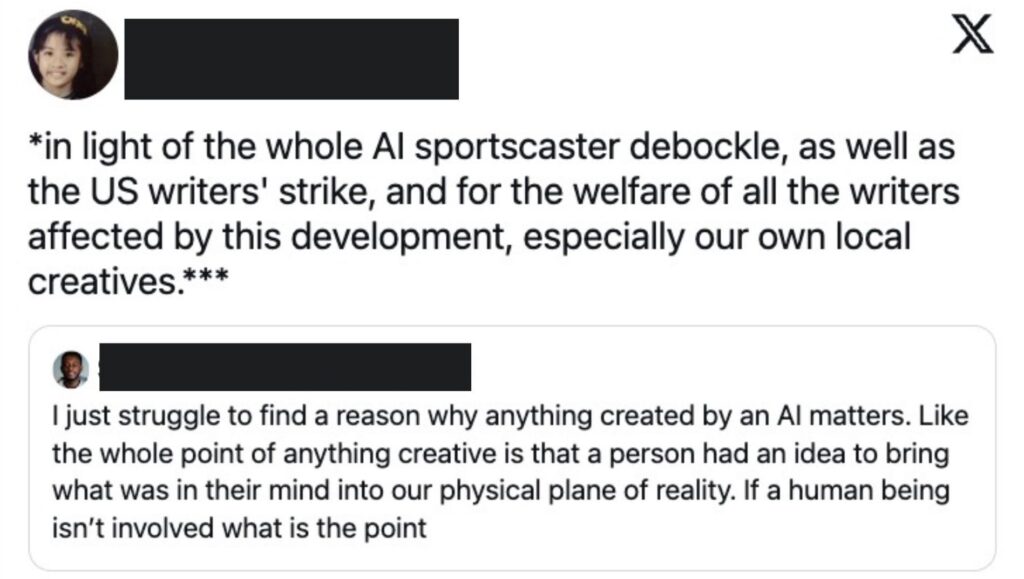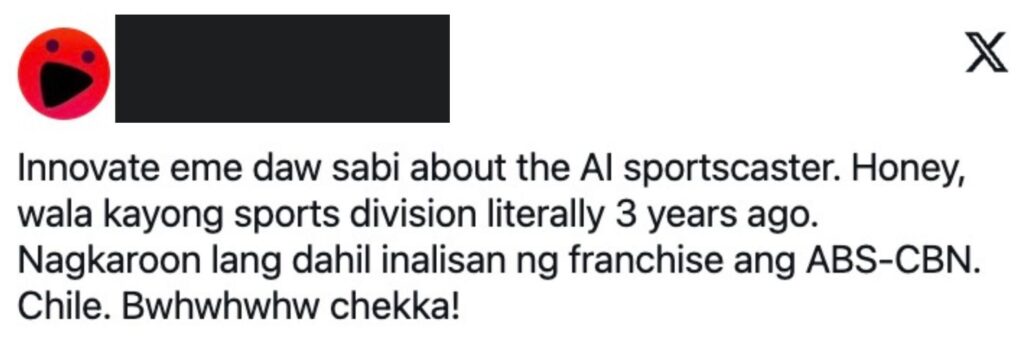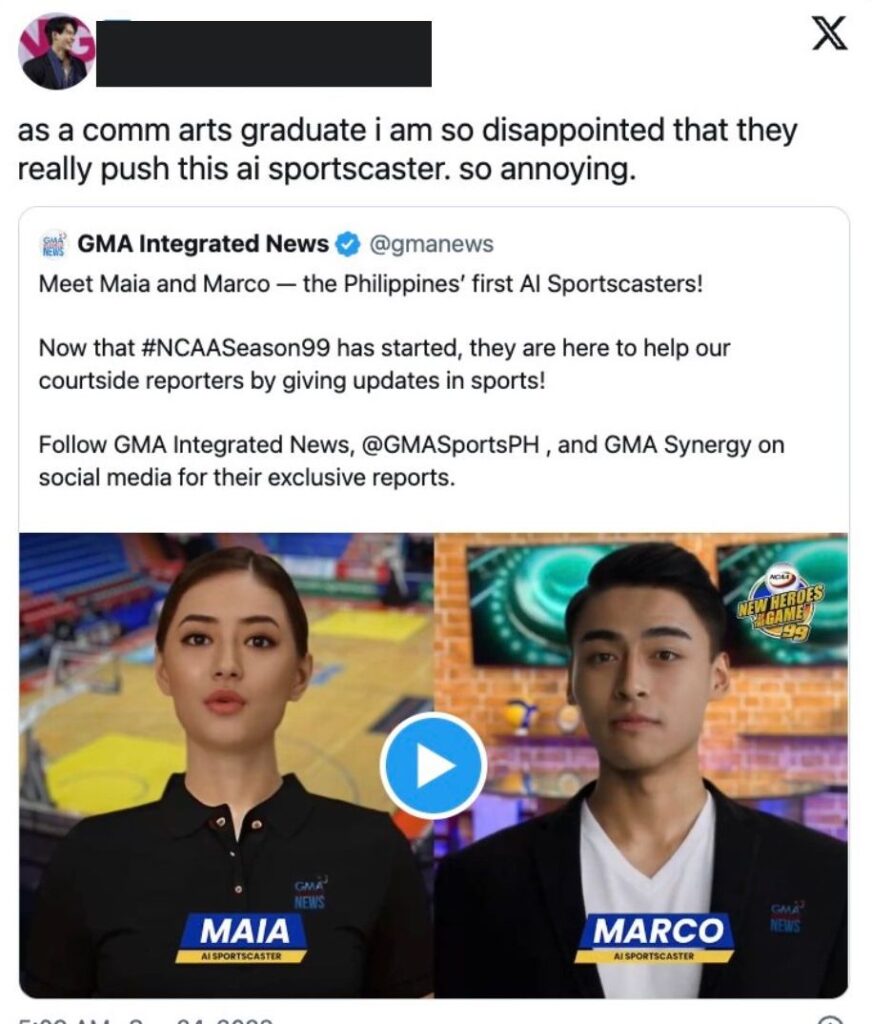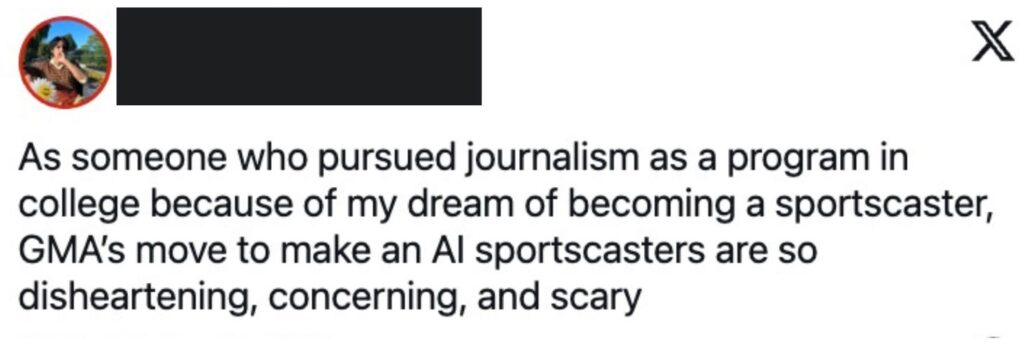The fear of most media practitioners has just been realized—AI is now openly taking the jobs of journalists and aspiring writers in the Philippines.
On September 23, 2023, GMA News unveiled the “Philippines’ first AI sportscasters,” Maia and Marco, as part of their roster of anchors, reporters, analysts, and panelists that report on the 99th Season of the NCCA. The announcement caught the eyes of many, who were surprised to see the use of AI debut in one of the biggest media networks in the country.
This addition of AI bots–or personalities, or program, or whatever we call it for now–however, has drawn the ire of numerous journalists, media practitioners, and even communications and journalism students, who are openly speaking against this move by GMA.













INQUIRER.net’s very own Multimedia Reporter, Jean Mangaluz, has outlined the media functions that AI simply cannot do:
AI cannot:
-authentically understand emotion
-appreciate a sports game and relate to fans
-taste and describe food for lifestyle
-fairly critique shows and movies
-go out into disaster struck areas
-question government officials
-tell human stories— Jean Mangaluz (@JMangaluzINQ) September 23, 2023
The National Union of Journalists of The Philippines (NUJP) has issued a statement about the need to really start talking about AI in relation to concerns of job security in media:
Statement | Time to really talk about AI
If, at least, to get more colleagues discussing the growing use of artificial intelligence in newsrooms, then the decision to use AI sportscasters is certainly something. pic.twitter.com/2OdbAG8Ut7
— NUJP (@nujp) September 24, 2023
How AI will be integrated in the Philippine media industry is an anticipated view, seeing how the writers’ strike in the U.S. has this as one of the reasons for their movement. Despite it’s now seeming reality, a lot of people are still opposed to it, for a variety of reasons.
At the top of the list, of course, is when AI is given preference over human talent—which is the case with the aforementioned local network. The company has chosen to invest its money in creating AI employees instead of hiring new talents to join their on-cam roster. While this decision is good in terms of showcasing our country’s digital capabilities (which is usually seen and felt in Western countries), it can jeopardize media practitioners and their jobs (see NUJP’s statement).
Imagine having studied Journalism as your degree in university, only to be staged by something created online using codes and graphic software, and yet clearly incapable of opening their mouths properly (yes, this is a hate comment). Imagine being years into your job, climbing up the hierarchy only to be overlooked for something just being fed with scripts and intelligence mined from actual practitioners like you, who have had to learn it for years.
Can you imagine losing your job and your dreams to some AI person/thing/whatever? No, of course not—you’ve never had that dread yet. At some point, everyone else may even be replaced by AI, seeing how useful and “cost-friendly” it is.
It’s like how everyone thought that robots would be the future. Well, we’re past robots now and moving on to software being fed with human-like characteristics.
But why go for “human-like” and not solely “human”? AI doesn’t have innately human characteristics (well, not for now, at least). They aren’t capable of feeling and sharing the multitude of emotions available to humans, nor will they ever be capable of replicating the things that make us human.
And now that there are institutions and companies endorsing this use of AI in a career that should only be using it as a supporting tool, welp–there lies our problem.
The AI revolution is here. Everyone, get ready.
Other POP! stories that you might like:
Renter-rentee drama? Of course, Philippine Twitter is going to eat it up
Well-meaning, or just generally ignorant of things? (You know what we’re talking about)
Why we must always be wary of ‘feel-good narratives’ on social media



